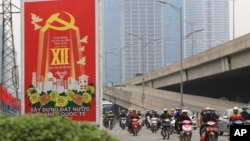This week, communists in Vietnam and Laos are picking leaders to run their countries for the next five years.
In Taiwan, the election of the first female president has prompted China to warn hopes for independence are “hallucinations.”
In the Philippines, candidate after candidate is being accused of not qualifying for the upcoming presidential contest.
In other words, 2016 could be a bumpy year for the Asia Pacific. And not just in electoral politics.
Troubling issues
The next batch of rulers will be navigating troubled waters, from the widespread economic slowdown to increasingly complex security linkages, said Evan Medeiros, managing director of the Eurasia Group.
“The tectonic plates of regional economic affairs, regional politics, and regional security are going to shift in significant and lasting ways in 2016,” Medeiros said at a recent summit here on U.S.-Vietnam ties.
He argued that economies across the Asia Pacific will have to find new sources of growth.
That’s especially true for countries whose financial fates hinge on exports, not least to China.
Gone is the era of GDP expansion at breakneck speeds. In that respect, China is both a symptom and cause of weak economies.
The global recession meant fewer customers for Chinese goods, which, in turn, meant China was buying fewer raw materials, like Australian iron and Indonesian coal.
Other factors, such as mounting debt and a property bubble, also fueled instability, with China’s stock market going haywire in recent months and its government reporting Tuesday that GDP growth hit a 25-year low.
Zero-growth economies
Not everyone agrees with Medeiros that Asia needs new engines of growth.
Amid the stagnation of recent years, the “zero-growth” movement has come back into vogue. Proponents believe economies can’t keep growing forever, but instead should stabilize enough to provide a sustainable quality of life for the majority.
Seongwon Park, an associate research fellow at South Korea’s Science and Technology Policy Institute, wrote in a blog post Sunday that one survey showed most South Koreans favor this “de-growth future.”
Some look to Japan as the best example of a steady-state economy.
“Even without growth, Japan seems to have a better handle on many of life’s pressing problems, including health care, longevity, public safety, and personal security than does the faster-growing and wealthier U.S. economy,” economist Ed Dolan writes.
Investing in competitiveness
But most Asian neighbors aren’t as rich as Japan or Korea.
To develop their economies, states from Cambodia to Myanmar are investing in roads and ports, education and training, and tech-based productivity upgrades.
Jocelyn Tran, senior director in Southeast Asia for Walmart Global Sourcing, said she wants countries like Vietnam to get the knowledge and technology transfers to become Walmart vendors.
Vietnam still needs to train its talent, from adding more English classes, to vocational training so the workforce can handle machinery, Tran said.
“What we hope to achieve is to bring the producers and vendors to the standards that could make Vietnam very competitive,” she said, also speaking at the summit.
She added, “There is an international competition. Products out of Vietnam have to stand side by side with products coming out of Japan or the U.S. or any other country.”
Security implications
Analysts say this rising prosperity has security impacts, allowing governments to spend more on aircraft, ships, and weaponry.
In that arena, countries may be benefiting from two very different trends: on the one hand, China’s fragile economy means its moneyed influence in Asia, especially as a main export market, could be weakening. On the other hand, neighboring militaries are recalibrating relationships, with China in mind.
“The geometry of security relationships in Asia are rapidly moving far beyond the traditional hub-and-spoke model,” Medeiros said, with the United States at the center and linked to Australia, Japan, the Philippines, South Korea and Thailand.
“That’s the 20th-century approach to security dynamics in the Asia Pacific," he said.
Medeiros predicted more diverse military alliances to come, connecting, say, India and Vietnam, or Australia and Japan. Whatever happens, he said, this will be a challenging year for Asia.




